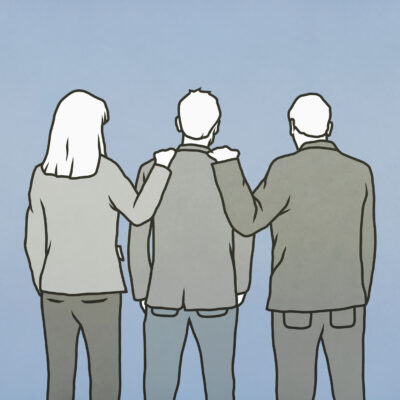SURVEY SAYS
JDC survey: Antisemitism ‘leading threat to Jewish life in Europe,’ but majority of Jewish leaders say they aren’t going anywhere

A man wears a kippah at a demonstration against antisemitism and Islamist terrorism and for the liberation of hostages held by Hamas, in Paris, France, on April 7, 2024. Laure Boyer/Hans Lucas/AFP via Getty Images
Across Europe, Jewish leaders are navigating a complex landscape marked by concerns over antisemitism. The newly-released results of a comprehensive survey conducted between March and April 2024 by the American Jewish Joint Distribution Committee’s International Center for Community Development (JDC-ICCD) illuminate both these leaders’ anxieties and resilience.
For instance, 79% of survey respondents cited antisemitism as the leading threat to Jewish life in Europe, asserting that combating it should be the top priority for community leaders. Additionally, 78% said they feel less safe living as Jews in their cities compared to before the Hamas attack.
At the same time, leaders indicated an increased determination to remain in their communities rather than emigrate (69% versus 66% in 2021) and commitment to ensuring Jewish continuity in Europe. Notably, younger respondents (age 40 or under) expressed the most optimism about European Jewish life and about Europe in general.
“The grim impact of Oct. 7 on Jewish communities in Europe is fully reflected in this study, but so is the commitment of local Jewish leaders to help their communities brave the storm,” Ariel Zwang, CEO of the JDC, remarked in a statement. “Since the attacks, we have worked hard to foster safe environments for thriving Jewish life, aid the most vulnerable and develop the next generation of Jewish leadership. This survey provides crucial data for guiding our ongoing efforts to strengthen European Jews, something that is ever more critical in the face of spiking antisemitism and political unrest.”


Left: Ariel Zwang, CEO of the JDC. (Courtesy/JDC) Right: Marcelo Dimentstein, project director of the JDC survey. (Courtesy/JDC)
The JDC-ICCD has conducted its survey of European Jewish leaders every three to four years since 2008, enabling researchers to track trends and shifts in attitudes over time. The 2024 survey, conducted online in ten languages with 879 respondents across 32 countries, offers a panoramic view of the state of Jewish communities in Europe. Respondents included organizational presidents and executive directors, program coordinators, and current and former board members from Jewish organizations; rabbis; principals of Jewish schools and professionals in Jewish education; young activists, directors or owners of media with communal content; and significant community donors.
The Oct. 7 terror attacks profoundly impacted concerns about antisemitism and respondents’ sense of safety and isolation among the Jewish leaders, with 38% of all respondents and nearly half (46%) of those aged 40 and under reporting becoming more distant from their non-Jewish friends.
“How I would define antisemitism in Europe after what happened on Oct. 7 is a more psychologically destabilizing combination of feelings, frustration, anger, anxiety, and betrayal by close people,” Marcelo Dimentstein, project director for the JDC survey, told eJewishPhilanthropy. “Many responses reflect feelings of loneliness and sadness, a search for closeness to communities and Jewish friends.”
“Calling what’s happening in Israel a genocide and seeing our friends, who we thought were allies, holding ‘Christians for Palestine’ flags against ‘apartheid’ is disheartening”, Susie Gordon, chief operations officer at LJRC in the UK, told eJewishPhilanthropy. “There’s a lack of nuance in the discourse, and people don’t realize they’re standing next to those who hate us, not just those who oppose Israel’s actions,” she added.
The survey also reveals that Jewish leaders are also more concerned about safety and antisemitism than they were three years ago, particularly in Western Europe. About 64% of respondents now identify antisemitism as a major concern, up from 50% in the previous survey.
This finding is supported by a survey published last week by the bloc’s Fundamental Rights Agency (FRA), which looked at participants’ experiences in the year before it was carried out and took place in the first half of 2023, before Oct. 7. Of the more than 8,000 Jews in 13 EU countries, including Germany and France, interviewed for the FRA survey, 96% saying they had encountered antisemitism in their daily life.
Worries about “terrorism and violence against Jews” have rose to 64% from 53% in the previous JDC survey, placing it among the top threats alongside “demographic decline.” Since Oct. 7, 38% of respondents have reported that their institutions experienced antisemitic incidents. Additionally, 83% anticipate that antisemitism will worsen in the coming years, up from 70% in 2021. Respondents indicated they are more cautious about how they identify themselves as Jews, and there was notable concern about “alienation of Jews from Jewish life.” Thirty-two percent said they are “less likely to wear a necklace or T-shirt with Jewish markers,” while 25% stated they are “less likely to wear a kippa.” (74%).
Despite these concerns, 73% of respondents still feel safe living and practicing as Jews in their cities (while 27% reported feeling unsafe), and the survey found notable confidence in government responses to community security needs. Approximately 78% of respondents felt their governments were adequately addressing security concerns, a slight increase from previous years. The assessment indicated that 41% of respondents felt their communities were very prepared, and another 41% felt somewhat prepared to handle an emergency. This confidence stems from constant police threat assessments, ongoing communication with community leaders and efforts to secure Jewish facilities.
This confidence spans both Eastern and Western Europe, though antisemitism concerns are more pronounced in the West, where more pro-Palestinian protests have taken place, explained Dimentstein.
“The Czech Republic remains a pro-Israel country with relatively low levels of antisemitism compared to Western Europe, partly due to its small Muslim community,” Petr Papoušek, president of the Federation of Jewish Communities in the Czech Republic, told eJewishPhilanthropy. “However, even here we are witnessing a rise in antisemitism, primarily online, in the media and at universities. Antisemitic expressions and ideologies are becoming more visible, leaving students and community members feeling isolated or hesitant to express their Jewish identity. This shift, while not as pronounced as in Western Europe, represents a significant change in our region.”
Resilience is also a recurring theme in the survey’s findings. Despite the rise in antisemitism, 85% of leaders expressed a steadfast commitment to fight back against antisemitism and ensure the continuity of Jewish life.
As one Jewish leader from the Netherlands wrote in their survey response: “It’s been like a rollercoaster dealing with the situation in Israel as well as the situation in the Netherlands, both personally and as a leader. We are constantly thinking and discussing necessary safety protocols and threat awareness, waiting for something horrible to happen—some kind of attack on our own community. But personally, I refuse to hide. I am proud, I am strong, I represent. My arms ache for wanting to embrace the victims in Israel. I am comforted by the sense of strength, unity, connection, and solidarity we feel as a community.”
The survey also reveals a pronounced shift toward strengthening communal ties and support within the Jewish community since Oct. 7. A majority (71%) of respondents reported that the attacks have created new needs within their communities, and nearly half (48%) indicated they are now more inclined to participate in demonstrations supporting Israel or combating antisemitism. This sense of solidarity was further reflected in the fact that 54% of respondents reported growing closer to both their Jewish friends and their broader Jewish community. Attendance at community activities also saw a slight increase, with 11% noting more engagement.
Notably, 97% of those surveyed underscored the importance of strengthening relationships among Jews across Europe, and 89% emphasized the significance of belonging to European Jewish organizations. Furthermore, 84% agreed that European Jews have a special responsibility towards one another, while 80% believe that interdenominational tensions are either minor or manageable.
Another significant finding was the shift in attitudes toward Israel among younger Jewish leaders. Historically less attached to Israel — a trend also observed in the United States — recent data indicates a dramatic change. In the wake of the Oct. 7 attacks, 82% reported a stronger commitment to Israel, with respondents aged 40 and under now more likely than in 2021 to strongly agree that “Israel is critical to Jewish life in the Diaspora” (44% in 2024 versus 25% in 2021).
Papoušek confirmed he has seen this trend in the Czech Republic. “After Oct. 7, many Diaspora Jews felt that we have to be more connected with Israel. It became natural that people even started to talk about it or think about it without us encouraging them, and many organizations started to work with Israel closely.”
As for economic concerns, the survey results gave some indications that financial stability has largely returned since the COVID pandemic, with 73% of leaders reporting that their communities are in a stable or improved financial position compared to the previous year; but at the same time, 41% of respondents cited “economic hardship among members/rising cost of living” as a serious or very serious threat to Jewish life (compared to 37% in 2021). Still, “poverty in your community” remains the lowest-ranking priority compared.
More than three-quarters (77%) of respondents said their organizations’ current financial situation is “healthy” or “tight but manageable,” but 21% said the situation is “unmanageable” or “critical,” up from 16% three years ago. Additionally, 43% indicated that they expect their communities’ finances to deteriorate in the coming years, compared to 39% in 2021, and 36% anticipate their organizations’ financial situations to deteriorate, up from 30% in 2021.

 Add EJP on Google
Add EJP on Google















